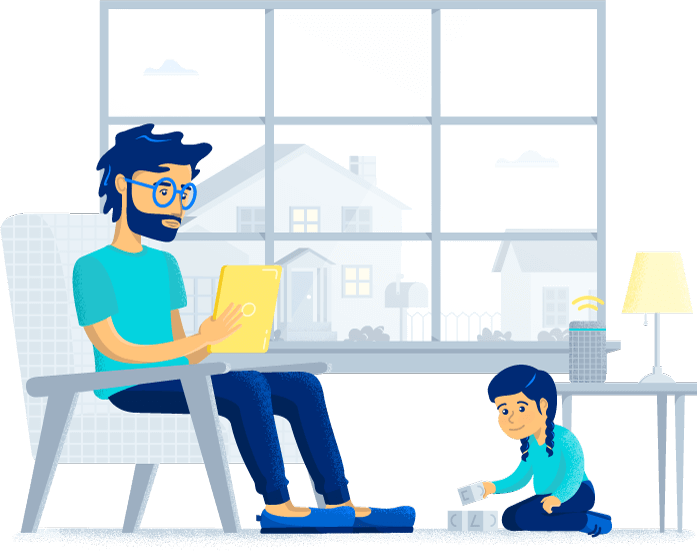The common culprit: Internet rush hour
Unfortunately, the issue is a common one, especially for cable internet users who are sharing bandwidth with every cable internet subscriber on the network. Just as roads can get congested from a rapid influx of traffic, so can your network, and when that happens, speeds slow for everyone on that network.
“Internet rush hour” — the time from 7 to 11 p.m. — is the busiest time on the web for people across the nation. Users like you are commonly free during this time and are doing the brunt of their internet activities. That competition for bandwidth is what’s causing your favorite streaming service to buffer.
How to fix slow internet at night
If you’re looking for ways to stop or ease your nightly speed decrease, there are a few solutions to try to remedy your internet slowdown before you think about upgrading your internet service altogether.
- If you’re using a dual-band router, switch to the 5 GHz Wi-Fi, which is less crowded.
- Disconnect devices you aren’t using.
- Switch internet activities to off-hours if possible.
- Move your router and other equipment to find the best signal in your home.
- Consider purchasing Wi-Fi extenders to increase the signal’s reach.
Ways to track data usage
- Your router: Some routers do track the amount of data you are using. Use the router’s app or log-in page, and look for a data usage section.
- Your ISP: Some ISPs provide an app to check on your data and/or a mid-month opt-in email alert to let you know how much you’ve used to date.
- Apps: Third-party apps like Glasswire and Data Monitor are available on Google Play and the App Store to monitor data use.
Internet still slow? Consider upgrading your plan or provider
If you cannot remedy your nightly internet slowdown issues, it may be time to reevaluate your internet plan, connection type or provider. It’s possible that your current internet plan doesn’t provide the speed you need in your household. Take our internet speed quiz to see if your internet speeds and your internet activities are compatible.
It’s also possible that your internet service provider is throttling your internet speeds during high usage hours of the day. For instance, Spectrum states in the fine print of their residential internet acceptable use policy that they may limit bandwidth for uploading data and reduce the priority of the network traffic that’s using the most resources during heavy traffic times. Providers without the capability to handle heavy traffic have also been known to throttle internet speeds during certain activities, like torrent downloads.
Also, consider your internet connection type and how upgrading your service could affect your internet experience. Switching to a DSL or fiber-optic internet connection where you won’t have to share bandwidth or there’s more bandwidth to share could be the solution to your night-time speed issues.
Allconnect: Let us compare providers for you
Why should you choose Allconnect? We’re the #1 broadband marketplace in the U.S, meaning you can trust us to search, compare and order internet and TV service for your home.
Get started
Written by:
Taylor GadsdenWriter, Broadband Content
Taylor is a veteran member of the Allconnect content team and has spearheaded a number of projects, including a data piece on the top fiber cities in the U.S. and a troubleshooting guide on how to connect your p…
Read more
Edited by:
Robin LaytonEditor, Broadband Content
-
Featured
![30% of Americans say their internet is too slow. Here’s how to fix it]() 30% of Americans say their internet is too slow. Here’s how to fix it Joe Supan — 4 min read
30% of Americans say their internet is too slow. Here’s how to fix it Joe Supan — 4 min read -
Featured
![Understand speed test results and learn to boost your internet speed]() Understand speed test results and learn to boost your internet speed Samantha Cossick — 6 min read
Understand speed test results and learn to boost your internet speed Samantha Cossick — 6 min read -
Featured
![What is a good internet speed?]() What is a good internet speed? Camryn Smith — 7 min read
What is a good internet speed? Camryn Smith — 7 min read
Latest
-
Thursday, July 25, 2024
Worried about losing your signal? This is how to keep your satellite dish cleanDavid Anders — 6 min read
-
Tuesday, July 23, 2024
The best free TV and movie streaming services 2024Camryn Smith — 5 min read
-
Tuesday, July 23, 2024
Everything you need to know about internet speedsRobin Layton — 8 min read





